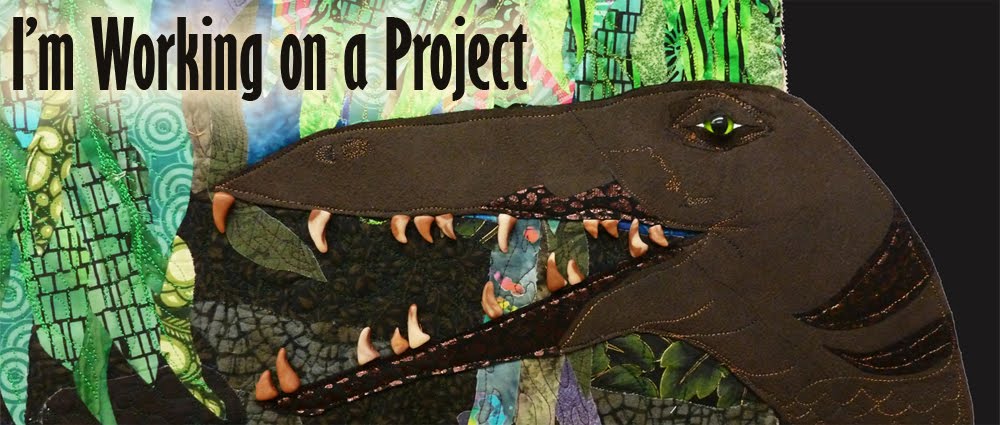Both classes were sponsored by handi-quilter, so we had handi-quilter longarms in the classrooms. Usually there are two students per longarm, but I lucked out and got my own longarm in both classes. It was really- really-unexplainably wonderful to have time on a longarm without having to be worrying about quilting something important (or using up my time when I should be quilting something important). That feeling of timecrunch and stress and irritation (which led to the meltdown I mentioned here) had just about made me give up on longarming all together. The classes at MQS however, really went a long way toward alleviating that bad taste in my mouth.
The class from Cathy Franks was on her cut-glass plate quilting designs. She was super fun, enthusiastic and upbeat teacher and I was so excited that her quilt won first place in the theme category this year. I'd definitely recommend a class with her if you can. Anyway, she's been experimenting with using a variety of fillers to create custom cut-glass-plate looks in her quilt backgrounds. In the class she taught us her process and styles and then set us loose to try them all out. If you're not sure what I mean by a cut-glass plate, they look like this. My biggest takeaways from her class were truly in how she divides up her space. I love learning new background fillers (can't stipple forever) and she had great ideas for those, but I never really can tell how to divide up my space to use them to the best advantage.
Here's one of her quilts called Max where she used this quilting technique in the background.
 |
| "Max" by Cathy Franks |
In the class she had prepared practice quilt sandwiches already marked with interlocking circles in sharpie, and here's all the fun quilting I did during the class. The last picture is of the back, obviously if you were marking a real quilt you wouldn't use sharpie, so the lines could be erased. The tension on the back isn't great, but at least you can get an idea of the effect of the patterns.
The class was so much fun, and one of the best things about it (aside from reinvigorating my interest in longarms) is that everything she taught could be translated to quilting on the home machine. Since most of my quilting int he forseeable future will be on the home machine, that's a very good thing! I'm actually looking forward to implementing her approach in my dog portraits.
Just last week I finally got the Singer 201 set up for FMQ and did some practice on my quilt sandwich from the class. I was so excited to translate a few things and do some of my very own quilting at home. The yellow thread in this picture is the quilting I did at home. I'm still trying to get the tension properly adjusted on the singer, but I'll get it eventually!










your quilting looks amazing!! I'd love to take a free motion quilt class for domestic machines (that goes beyond the basic stipple!). It's not going to happen in my near future though so I've been quilting along some samples for the Bella Solids Parade on my blog. I'm really impressed with what you've done here - I'll have to bookmark it to give it a try! :)
ReplyDeletevery cool! glad you've decided to stick with it, despite the frustrations. :-) your quilting looks great!
ReplyDeleteThat is great! I wish we had some place to try out longarming where I live, but no such luck. I like how you practiced in the circles.
ReplyDeleteWow what fun that is. You have some great circles. I think I'm going to give this a try. Beautiful.
ReplyDelete